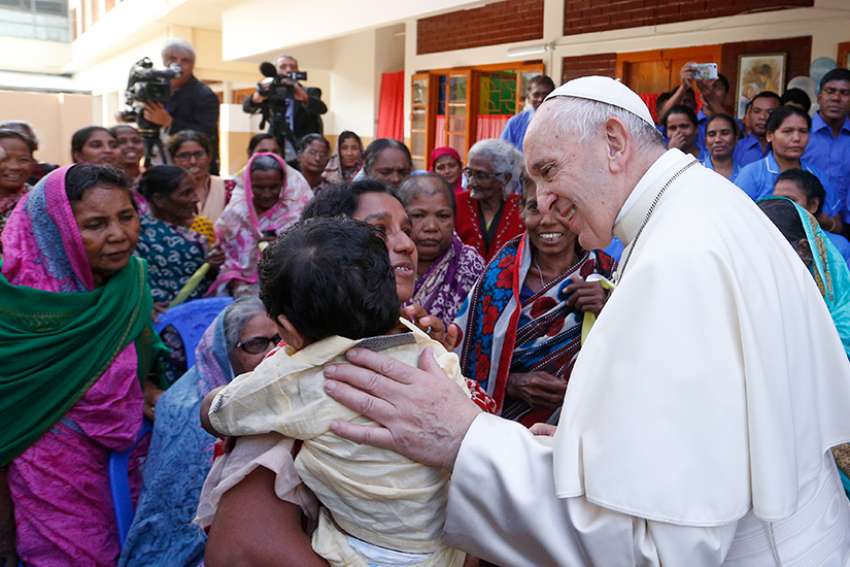Pope Francis greets people as he visits the Mother Teresa House in the Tejgaon neighborhood in Dhaka, Bangladesh, Dec. 2.
CNS photo/Paul Haring
Editorial: Pope gets it right in Myanmar and Bangladesh
By Catholic Register Editorial
In a media world where absurdity abounds, one of the silliest statements of late is a claim that a trip to Myanmar damaged the moral authority of Pope Francis. Quite the opposite.
The Pope was rebuked by some media and human rights groups for heeding voices of caution and avoiding the specific term “Rohingya” when speaking about that nation’s persecuted Muslim minority during three days in Myanmar.
Among his critics, The New York Times suggested the Pope was manipulated and his failure to utter the “R” word “cast a pall” over his trip and was a “tactical blunder.” A spokesperson for Human Rights Watch claimed the Pope missed “an important opportunity to speak truth to power.” His caution diminished his standing as the world’s most credible moral voice, suggested others.
It’s all nonsense. Pope Francis went to Myanmar and Bangladesh to build peace and encourage faith, not to inflame tensions in an already tense part of the world. No doubt he would have won international praise had he denounced Myanmar’s generals and publicly demanded justice for the persecuted Rohingya people. He could have referred to the Rohingya by name and openly rallied for them to be granted their rights as a recognized ethnic group. That would have been easy. Who knows, it might even have won him another cover as Time’s man of the year.
So, yes, it would have been popular — but reckless.
Long before he went to Myanmar, the Pope was vocal in denouncing the violence against the Rohingya and adamant in supporting their rights. But saying so in Myanmar as religious minorities looked down the barrel of a gun would have served no practical purpose other than to irritate already twitchy trigger fingers.
Francis the statesman was wise to heed the advice of local Church leaders and bite his tongue when it came to “Rohingya” until he was across the border into Bangladesh. As he later put it, he “did not have the pleasure” of a public pronouncement but made his case in private.
There was no need for him to say “Rohingya” because his very presence in Myanmar spontaneously brought that word to mind. As soon as he arrived, the world’s attention focused on this forgotten part of the world and the atrocities happening there. When Francis preached about injustice and persecution, it was abundantly clear he had the Rohingya people in his heart if not directly on his lips. He made their case.
The Pope could have earned personal praise by appeasing critics and referring to the Rohingya by name. But rather than make himself the story — as many leaders would do — he absorbed criticism and advanced their cause privately.
Only those who have not been following his papacy should be surprised.
Please support The Catholic Register
Unlike many media companies, The Catholic Register has never charged readers for access to the news and information on our website. We want to keep our award-winning journalism as widely available as possible. But we need your help.
For more than 125 years, The Register has been a trusted source of faith-based journalism. By making even a small donation you help ensure our future as an important voice in the Catholic Church. If you support the mission of Catholic journalism, please donate today. Thank you.
DONATE

